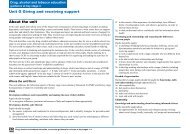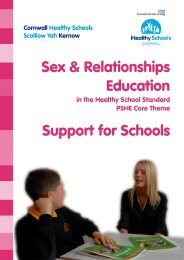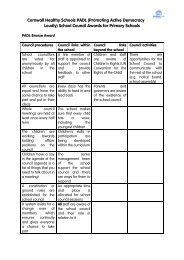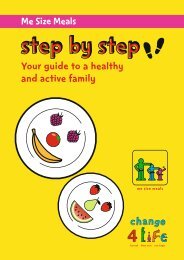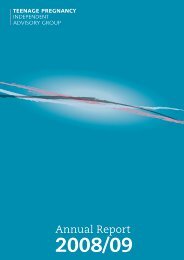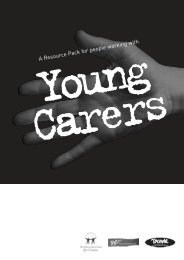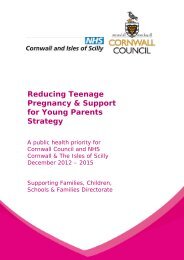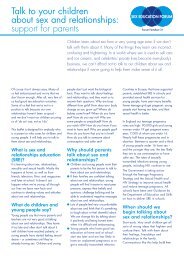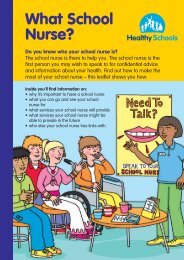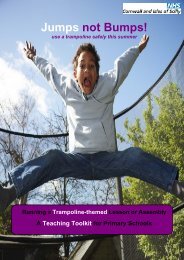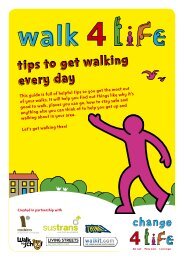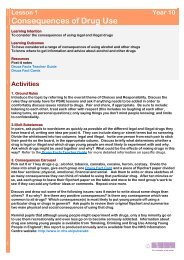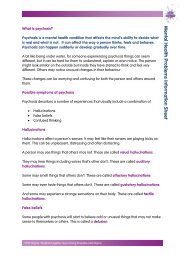Policy into Practice Secondary - Cornwall Healthy Schools
Policy into Practice Secondary - Cornwall Healthy Schools
Policy into Practice Secondary - Cornwall Healthy Schools
You also want an ePaper? Increase the reach of your titles
YUMPU automatically turns print PDFs into web optimized ePapers that Google loves.
SRE in the National <strong>Healthy</strong> School Standard: CHSP Support for <strong>Schools</strong><br />
SRE: policy <strong>into</strong> practice checklist: secondary<br />
About your policy:<br />
Yes No Part<br />
There is a named member of staff with overall responsibility for SRE<br />
A named governor also has designated responsibility for SRE<br />
The policy accords with DfES: 0116/2000 (Sex and Relationship<br />
Education Guidance)<br />
The policy makes a public statement about the values the school is<br />
committed to and which will inform the SRE<br />
The policy defines SRE<br />
The policy describes content, including discussion of attitudes and<br />
values, knowledge and understanding and personal and social<br />
skills<br />
Indicates what is taught and when<br />
Describes how it is organised<br />
Indicates who will teach it<br />
Indicates resources available and checks resources<br />
for suitability and effectiveness<br />
Describes teaching approaches<br />
Indicates how pupil progress is assessed<br />
The policy discusses the right of parents to withdraw their children<br />
from SRE that is not part of National Curriculum Science<br />
The policy has a strategy in place to invite parents wanting to<br />
withdraw their children <strong>into</strong> school to discuss their concerns and<br />
provides information for parents to help them talk to their children<br />
The policy indicates how the SRE programme is monitored and<br />
evaluated to inform the future planning and development of SRE<br />
within the school<br />
The policy indicates how children and young people are consulted<br />
about the policy and its implementation, including how well their<br />
needs are being met<br />
The policy takes <strong>into</strong> account the guidance provided by the DCSF<br />
publication Homophobic bullying: safe to learn, 2007 (see<br />
information below)<br />
The policy covers confidentiality in accordance with the guidelines<br />
for safeguarding children and with the school's confidentiality<br />
policy<br />
The policy indicates how the school will consult with parents,<br />
including during policy development<br />
Local support agencies have been consulted regarding this policy<br />
(e.g. Teenage Pregnancy Coordinator, School Nursing Service)<br />
Consultation with feeder primary schools so that policies<br />
complement each other as appropriate<br />
<br />
<br />
<br />
<br />
<br />
<br />
<br />
<br />
<br />
<br />
<br />
<br />
<br />
<br />
<br />
<br />
<br />
<br />
<br />
<br />
<br />
<strong>Cornwall</strong> <strong>Healthy</strong> <strong>Schools</strong> Team www.cornwallhealthyschools.org/ healthy.schools@ciospct.cornwall.nhs.uk 17
SRE in the National <strong>Healthy</strong> School Standard: CHSP Support for <strong>Schools</strong><br />
About your SRE programme:<br />
The programme is based on consultation with young people<br />
using the Are you Getting it Right? Toolkit SEF, 2008 – see our<br />
website for details<br />
The programme is a planned part of the school’s PSHE and<br />
Citizenship programme and Science Curriculum and is clearly<br />
timetabled.<br />
Collapsed curriculum days / weeks are only used to support a<br />
planned programme of timetabled PSHE – not to replace it<br />
<br />
<br />
<br />
The programme covers all key stages <br />
The programme is differentiated so that it is appropriate to pupils’ <br />
age, ability, gender and maturity<br />
The programme includes specific learning outcomes <br />
The programme accords with the Teenage Pregnancy Strategy <br />
objectives 14<br />
The programme includes learning about the reasons for delaying<br />
sexual activity and the benefits to be gained from such a delay<br />
<br />
The programme covers contraception, abortion, STIs and HIV <br />
<br />
The programme recognises the importance of Social and<br />
Emotional Aspects of Learning (SEAL) in contribution to the SRE<br />
outcomes<br />
The programme is delivered by staff who want to teach SRE and<br />
feel confident to do so<br />
CPD / INSET on SRE has taken place in the last two years for all<br />
staff involved in teaching it<br />
Outside agencies are used to support the school’s delivery, they<br />
are not the only input<br />
The programme ensures that appropriate staff are able to talk to<br />
individual pupils about SRE<br />
<br />
<br />
<br />
<br />
Staff are aware of local teenage pregnancy and STI issues <br />
Staff are aware of the available support services <br />
Pupils are informed about local professional advice and support <br />
as part of the PSHE curriculum and individually as appropriate<br />
Relevant, up-to-date leaflets are available and easily accessible<br />
to students<br />
School has a policy and procedures to deal with teenage<br />
pregnancy issues, including support for teenage parents<br />
(including fathers)<br />
<br />
<br />
14 All children and young people have access to a PSHE/SRE curriculum which is unbiased, inclusive, consistent, age appropriate and countywide. (Teenage Pregnancy strategy document<br />
2007)<br />
18<br />
<strong>Cornwall</strong> <strong>Healthy</strong> <strong>Schools</strong> Team www.cornwallhealthyschools.org/ healthy.schools@ciospct.cornwall.nhs.uk



